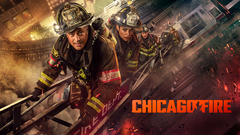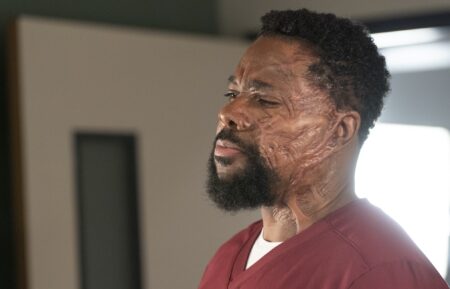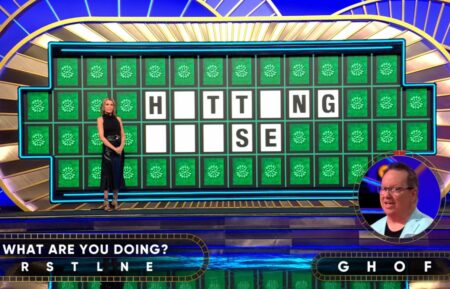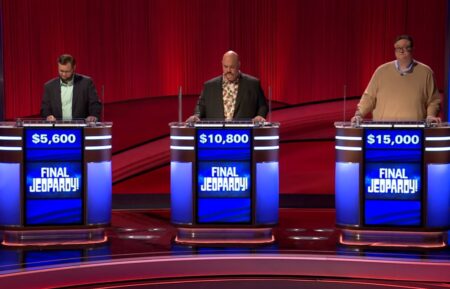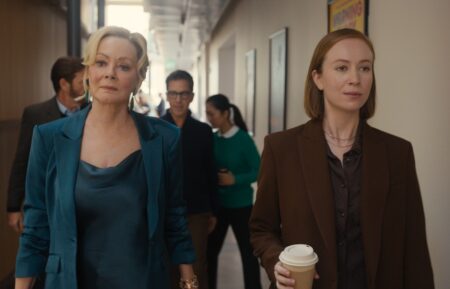‘Chicago Fire’: Eamonn Walker Teases Potential Death & Firings in Boden’s Return
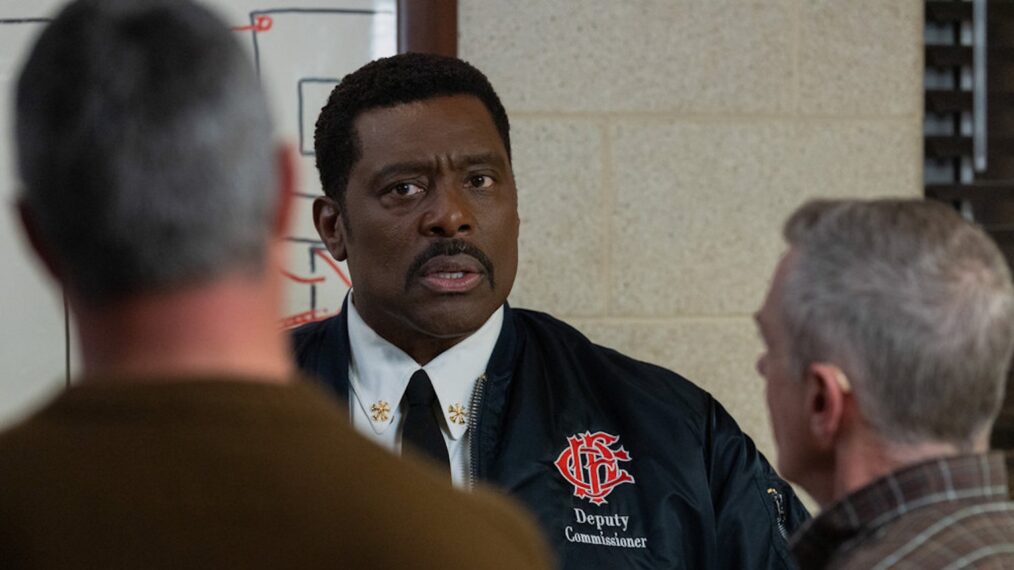
Q&A
Firehouse 51 just isn’t the same without Wallace Boden! Fortunately, Eamonn Walker returns as the beloved now deputy commissioner in the Wednesday, April 16, episode of Chicago Fire. (His last episode as a series regular and last appearance until now was the Season 12 finale.)
He’s back in “Post-Mortem,” to investigate a disastrous firefight and the surrounding mystery that left one of their own in peril. Below, Walker previews his return.
How was it though to step back into Boden’s shoes, but have it be a Boden who has to question these firefighters that he cares so much about and question the person who is now in his office?
Eamonn Walker: Yes. All of those things had made an impact, and so when I stepped back in as Eamonn and I walked onto Cinespace lot and I hadn’t been on the lot since I walked away, I was like, “Oh my God, I’m back,” and, “Okay, let’s do this.” And then I went and got changed, put the uniform on — this, that and the other. And then I walked onto the set, and there was the cast and the crew and the production. There was like a round of applause and a welcoming no other. There were tears and I was very like, “Okay, well thank you. That’s a little overwhelming, but let’s go back to work. Let’s do it. Let’s move.” So it was amazing to go back.
In the promo, Boden says the night before was every firefighter’s worst nightmare. Then the logline teases that one of their own was left in peril. So what can you say about what happened that leads to Boden coming in? How bad did it get?
Oh, it’s bad. The only reason a deputy commissioner has turned up at a firehouse is because it’s bad… The chief would normally handle this, but right now, because what’s in question is the choices and decisions you made, every officer is potentially by the end of the night going to be fired. So that’s why the deputy commissioner is there, and the fact that they’re his friends and extended family makes it doubly hard. But you know Boden, he will do his job first. And so part of the thing that is being played out is them wanting that old relationship back and Boden not allowing it to happen because the seriousness of the incident is the thing that must be played out first.
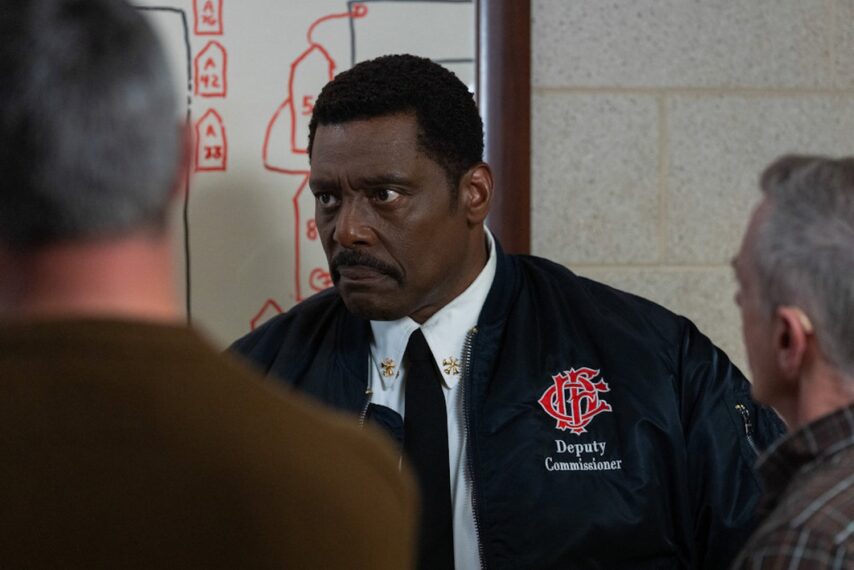
Peter Gordon / NBC
What can you say about that firefighter that was in peril?
I can say this: I’m not going to tell you who it is. Nice try though. It is a fan favorite, and that’s why this episode works so well. That’s why the writing, when the moment they sent it to me and said, “Do you want to come?” I was like, “Definitely.” Because it’s very special. The way it’s shot is amazing. It’s new for Chicago Fire. And Reza [Tabrizi] who shot this particular episode was so excited to shoot it, and when he explained all of his ideas for it, I was like, “Yeah, this is a movie. This isn’t a normal episode of Chicago Fire in any shape or form.” So I hope that you will be on the edge of your seat because we were when we were making it.
When I spoke with Dermot Mulroney, he said that Boden goes full inquisitor. So with which firefighters does Boden really have to specifically do that?
If you’re an officer, you’re in question because you’re the ones who make all the decisions about to save the people in the house and to make sure that your fellow firefighters come home, and one of them didn’t. One of them got left behind, and that can’t happen. And not only did they get left behind, they got hurt, and they’re potentially going to die. And we have to make sure that we know what we’re going to do and who’s responsible come morning. And this right now, this investigation is happening, the fire is still not out. The investigation has started then — that’s the immediacy of this investigation and how intense it all is.
What can you say about those conversations that Boden has with Kidd (Miranda Rae Mayo), Severide (Taylor Kinney), and Herrmann (David Eigenberg)?
They’re difficult, and they’re not wanted. They don’t want to be in this situation. They don’t want to be on the other end of Boden’s ire. You’ve watched enough episodes, you know who Boden is.
And they don’t want to disappoint him either, which is always worse.
And for a majority of these people who are now officers, Boden’s taught them what they know. So it’s different with the chief, but the chief is on the hook, and every officer in that house is on the hook, and nobody knows who’s going to be there by tomorrow morning. And let’s put it this way: If this person dies, a head will roll.
Speaking of the chief, how would you describe Boden and Pascal’s dynamic? Because showrunner Andrea Newman told me it’s contentious and then Dermot called it a great standoff.
I wouldn’t say it’s a great standoff or anything like that. I’m going to turn around and say there’s a crackle between the two of them. It’s a really nice tightrope between the pair of them because in some ways, they’re very similar but at the same time completely different. And that crackle is the thing to watch. It’s the thing I think will keep you on the edge of your seat, how these two tall pillars of the firehouse have to make out their differences. But there’s only one person who’s going to win at the end of that, and that’s the person in the hierarchy, and that’s Boden if he decides to make it. But here’s what you know about Boden is he’s a very fair man, and he will only pull that trigger if you are at fault. And if you’re not at fault, he will fight for you. And so that’s what’s on the line. So what I would say is there’s a crackle and there’s mistrust, but that’s a one-way street.
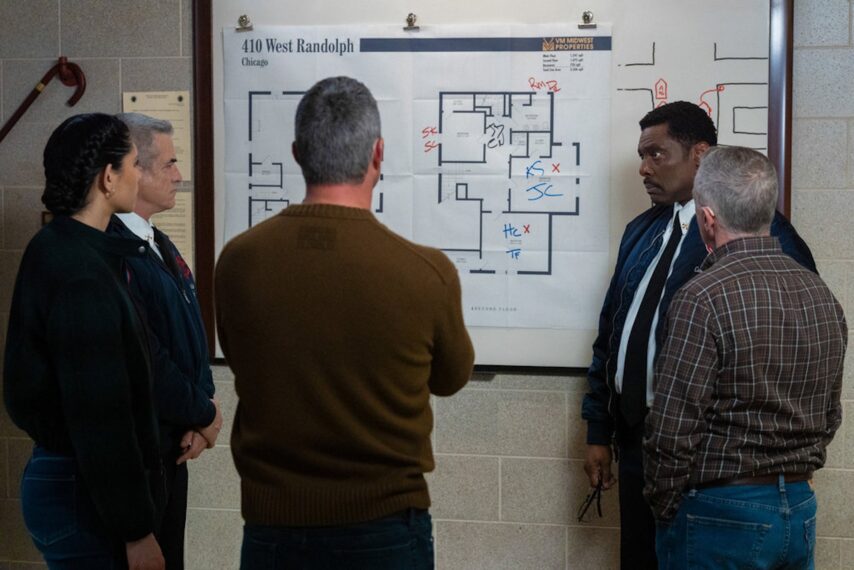
Peter Gordon / NBC
We know that Boden wanted Herrmann to be chief when he left. So how does Boden feel about Pascal’s leadership style? Because it is very different from his.
It is very different. And the thing that I will give you is, but people won’t know, but in the backstory … it’s not an accident that Pascal is the chief. Somebody put him there — who do you think put him there is all I’ve got to say. So things had to be shaken up and the comfortability that everybody had, familiarity breed contempt and laziness and all sorts of stuff and they needed a shake-up. And so it’s been good. It’s made everybody have to think about the P’s and Q’s. So it’s a good thing all around. At the end of the day when you go on your full learning curve, he knows it’ll still be a better firehouse.
Boden was not going to trust just anyone with 51 because that is his family.
That’s it. And so if you think about it, you haven’t heard from Boden. Even though with all the contention that’s been going on with the new chief, Boden hasn’t come in and said this is a terrible place, it’s a terrible person. You know what I mean? So I just want you to think about the aspect of it. So who put him there? He knew he was a good chief, he’s a good chief. He may go about it differently, but he’s a good chief.
Pascal has been questioning whether or not Herrmann really wants to be chief. And I have to say how much I enjoy the Boden and Herrmann relationship in general over the years. What is Boden seeing in Hermann? Is Boden seeing that in Hermann as well? Does that come up?
I think you’ll see something of it, but the immediacy of this threat of somebody dying and somebody being fired takes over. So there isn’t much room for any old relationships. This needs to be handled, but it’s definitely in the room. But how much of it you deal with and how much you get to see as an audience will be very little, but it’s in there.
Will we see you again after this episode?
If they write it, I will come.
What would you want to do as Boden should you come back? Would you want to be in the field? Now Boden has a desk job…
Yeah. There’s another thing I’ll give you: To be a firefighter, it’s a young man’s job. There’s a lot of lifting, a lot of running, a lot of carrying, and then you have to put yourself in a lot of heat. And so Boden’s not a young man. So I have not thought so far as to what I would do next. I’m just trying to get past this one. I’m just trying to get you to watch this one and enjoy it as much as I enjoyed filming it because it was so different. It’s not a normal Chicago Fire episode. You’re watching a film. The writing is different. The way it’s put together is different, Reza shot it differently. And I know even when I read it, I was on the edge of my seat. I was like, “Yeah, I’m coming to do this. It’s an excellent episode.” So it reads excellent, and I’m hoping you enjoy it as much as we do.
It’s the Rashomon of it, the different points of view, and those are always fun.
Bingo. [Laughs]
With whom does Boden have the most tense conversation in this episode?
Every officer has an incredibly tense conversation with Boden in this episode because everybody knows pretty quickly they may not be in a job in the morning.
That’s concerning, but that’s so tough for Boden. But like you said, if anyone’s going to do it, he will do what needs to be done.
Exactly. It is tough, but safety first, always. To be a firefighter, to be an officer and a firefighter, you are always walking with somebody’s life in your hand. And in the case of an officer, you’ve got several lives in your hand. You have to make sure that these people get home to see their families. You make the wrong decision, they don’t. Then you have to turn up at that person’s house, knock on the door, and say they’re not coming home. So as much as we enjoy watching the show, it’s a microcosm of that particular society and it happens every single day. So that’s why my pride to be in Chicago Fire will never, ever go away because I know the job that they really do. When you see your next firefight, you say, “Thank you for your service, thank you for putting everything on the line.” It’s what they do. Steve Chikerotis put that in me.
What about 51 still feels the same to Boden as it did back in Season 1? There’s been so many changes over the years
But the core is the same and the core of love and respect and honoring what we do as actors, but honoring these first responders in their house — the fact that Firehouse 18 would let us shoot there every single week, we’re actors, we’re not always quiet. Sometimes they sleep during the day. And that’s why I mentioned Steve Chikerotis because he imbued every single actor of that first cast with his love of the Chicago Fire Department. And when we were actors turning up from LA and London and New York, we had no clue what that was. But very, very quickly, we came under his umbrella and he put that love into us and you can’t turn up in that show and not start to put it back.
There was a love there, and when I walked back onto the set, it was there and they gave it to me. When the cast and the crew and the production team come out and go, well I’m home, you go there it is that camaraderie, some difficult stuff through 35 below trying to talk while the blood in your face freezes. We can only do that if you’ve got your people behind you and somebody watching you go, okay, have some water now. Okay, warm that person up. Get the van. Get the van out. No, they’re freezing, but we’ll bring them back in a minute. That is a togetherness that it isn’t everywhere. Just trust me. You know the business, that isn’t everywhere. It’s always been there in Chicago Fire.
Is there any moment where Boden can feel proud of this firehouse that he built in this episode with what’s going on and with all these questions that are surrounding what happened with the call?
He is proud of the fact that he taught most of these people how to do the job, having gone through it himself. And so these are now officers. They didn’t start off as officers, and so he’s already proud and everybody’s come up through the ranks and all the rest of it. He’s proud that they are where they are. But you have to take the rough with the smooth and taking responsibility for your actions and your choices is part of it. And so I know you know I will do my job if you are at fault and that person dies.
Chicago Fire, Wednesdays, 9/8c, NBC



